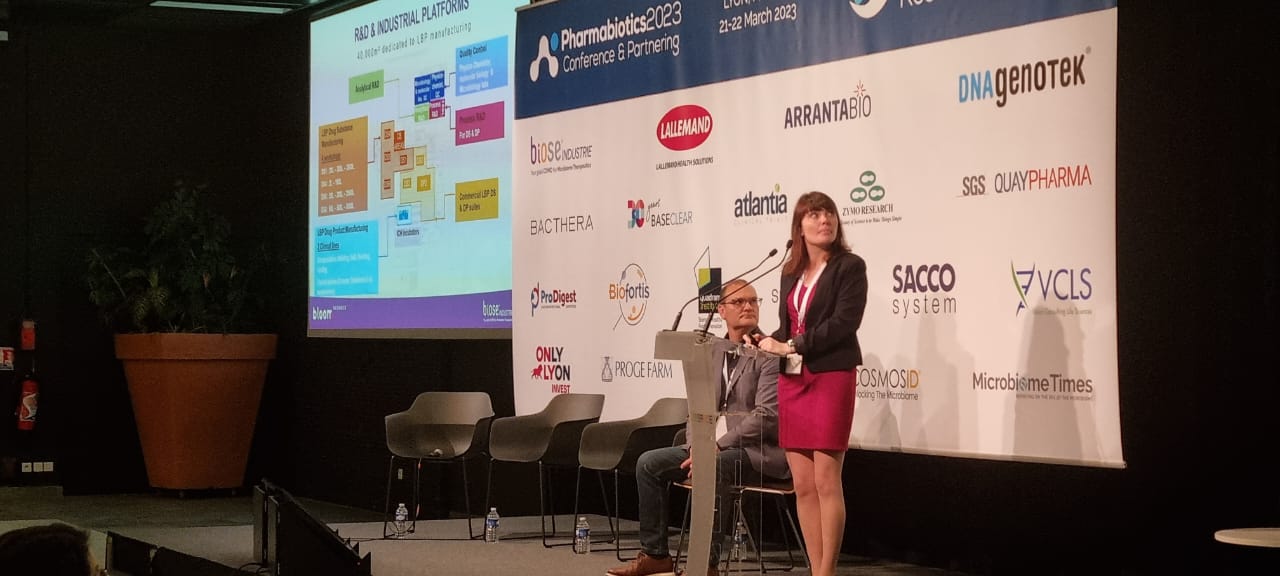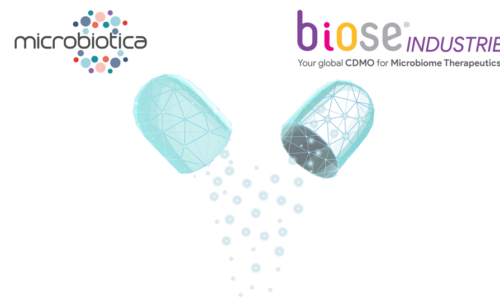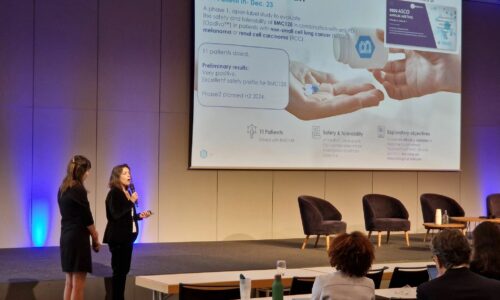The Pharmabiotics Conference & Partnering returned for 2023, bringing together cutting-edge microbiome researchers and drug developers. In the heart of Lyon 220 microbiome stakeholders gathered to explore key topics facing the field: from regulatory hurdles to considerations for spinning out. The event featured three panel discussions on developing a drug from “concept to consortia”, the impact of the SoHO revision on the field, and translating from academia to industry. Ken Blount, VP Microbiome research, Ferring Pharma represented the event’s keynote presentation, discussing Rebyota’s regulatory journey to FDA approval.
Biose had the privilege of making a joint presentation alongside our client Bloom Science. Biose’s Head of Programs, Claire Derlot, and CEO of Bloom Science, Christopher Reyes took to the stage to talk about Bloom’s breakthrough work to develop live biotherapeutics for neurological diseases. Bloom’s lead candidate, BL-001, is a rationally selected consortia product which aims to treat the CNS indications: Dravet Syndrome and Developmental Epileptic Encephalopathies. It’s primary mechanism of action is increasing GABA levels in the hippocampus, reducing hyperexcitability. In multiple murine seizure models, BL-001 treatment significantly reduced seizures.
Claire outlined the collaboration between Bloom and Biose, to bring the LBP to GMP certified clinical release. The described journey extended all the way from confirmation runs of Bloom’s strains on a pilot scale of 20L and 150L bioreactors, up to the current clinical batches at 2000L and 3500L. Describing the benefits of the partnership Christopher identified de-risking of CMC, overcoming technical formulation challenges and regulatory filling support as key advantages of the collaboration.
Standout presentations from the event included:
Staffan Stromberg, CEO – Infant Bacterial Therapeutics
Staffan’s talk was focused on navigating the roadmap to achieve success with pharmaceutical grade probiotics. Stromberg explored IBT’s Phase 3 asset LBP IBP-9414 for infant necrotising enterocolitis (NEC), which is the leading cause of premature infant death in the US. Positioning, IBP-9414 as a preventative for the high cost of surgical intervention for NEC, the launch is anticipated for 2025. Staffan highlighted IBT’s stringent regulatory approach for their Chemistry Manufacturing Control.
Randi Rich Head of Operations, Executive Manager & Co-founder – Freya Biosciences
Elleke Bosma, Director Microbiome Research – Freya Biosciences
Randi and Elleke discussed the need for microbiome therapeutics for women’s health conditions. Referencing high rates of infertility, endometriosis and premature birth, Freya identified a shared underlying cause: vaginal dysbiosis. The disruption of the immune system and vaginal microbiome interface leads to inflammation which results in disease – they explained. Randi presented Freya’s discovery platform, DYSCOVER, which uses metagenome sequencing of the vaginal microbiome and transcriptome profiling to identify proinflammatory markers in dysbiosis. The donor-derived program for manufacturing their FB101 was also discussed, following the path laid by Rebyota for donor-derived material and SER-109.
Alice Cheng, Clinical Assistant Professor – Stanford Health Care
Cheng discussed her work in engineering a synthetic complex bacterial community. Cheng opened with the limitations of simple communities for studying microbiome impacts on phenotypes in mice models, highlighting their failure to recapitulate phenotype. Describing her journey to produce a complex community, Cheng explained her use of the HMP dataset, and iteration to generate a human-resembling microbiome in gnotobiotic mice. The resultant community remained stable across generations and had a near-equivalent bile acid pool with the human microbiome. Cheng suggested ~100 strains may be sufficient to recapitulate the metabolic aspects of the native microbiota.
Jun Terauchi, Steering Committee Chair; CSO – Japan Microbiome Consortium; Metagen Therapeutics Inc.
Terauchi delivered a two-pronged talk on the Japan Microbiome Consortium, and Metagen Therapeutics. The first part of the presentation outlined the JMBC’s work to standardise protocols to facilitate microbiome drug commercialisation. He explained the multiplex nature of microbiome measurements creates significant room for error and variation, and that the JMBC is working to create international harmonisation standards to address this. Speaking as CSO for Metagen Therapeutics, Terauchi explained their reverse translational platform to develop FMT treatments for ulcerative colitis. Terauchi identified allergies and FMT for other indications as being future drug development targets for Metagen.
Shiri Meshner, Vice President R&D – Biomica Ltd.
Meshner discussed Biomica’s platform and clinical progress. Biomica’s PRISM platform uses computational big data for predictive function-based drug design. Describing the rationale for their lead candidate, she explained, BMC128 is designed from specific function enriched in responders to Immunotherapy anti PD-1. In preclinical studies, BMC128 significantly enhances tumour infiltration of activated immunocytes. Biomica’s first-in-human trials began in July 2022.
Sarah Lebeer, Professor – University of Antwerp
Lebeer explored the opportunity for a live biotherapeutic product to protect against SARS-CoV-2 and related viruses. Lebeer highlighted the target potential of the lactobacilli niche in the upper respiratory tract, for its potential to inhibit respiratory viruses. Drawing on research that found probiotics reduced the incidence of upper respiratory tract infections, LeBeer’s group developed a throat spray consisting of inhalable lactobacilli. Their early research showed temporary colonisation of their strains in the upper respiratory tract, which remain viable and immunostimulatory. The speaker stressed the need for confirmation in larger trials and the optimisation of nasal spray with AMBR2.
Conclusion
The recent Pharmabiotics Conference explored the cutting-edge of microbiome therapeutic development. Biose Industrie were thrilled to connect with current and potential clients. We look forward to next year’s conference!



